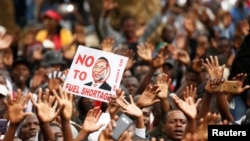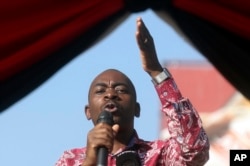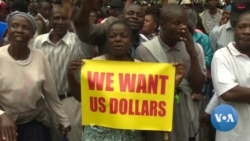Opposition supporters marched Thursday in Zimbabwe's capital, demanding that the government do more to fix the sinking economy. The government allowed the protest, but said marches will only derail progress.
Ahead of the rally, President Emmerson Mnangagwa warned the opposition not to abuse their right to demonstrate by engaging in violent or unruly acts.
Junior Information Minister Energy Mutodi later said the march was pointless.
"It was a big flop, because people are seeing the unworthiness of gathering in the streets and advocating for things which the government is already doing," he said. "We are saying to those in the opposition, they must join the government in development projects in ensuring that the country moves forward. Everyone is free, but do not just demonstrate unnecessarily."
Nelson Chamisa, the leader of the opposition group Movement for Democratic Change, vows to keep applying pressure until the government acts to ease the country's economic woes.
"We are not going to stop protests until that [new] 2 percent tax on mobile transactions is scrapped. It's thievery; it must go," he said. "You [government] ask citizens to pay duty in foreign currency, yet they are paid in local currency. All civil servants and everyone must be paid in U.S. dollars."
Zimbabwe has grappled with currency shortages for years, since abandoning its own dollar in 2008 amid record-setting inflation. People use U.S. dollars as well as the British and South African currencies, but there isn't enough to go around.
While the government says protests are unproductive, some Zimbabweans say they feel the demonstrations are the only way to go.
WATCH: Zimbabwe Government Calls on Opposition to Stop Protests
Protester Effi Mangoro, 73, says the situation is getting worse, and people are now surviving on God's grace, as the government is not taking care of them. In additions, she says, people are getting sick, yet the hospital asks to be paid in U.S. dollars. "Where do people get them?" Mangoro asked.
Kimbo Richard, 69, was also protesting Thursday.
"You can't even borrow even 20 cents, 30 cents, a dollar or two dollars because everyone wants to borrow, too," he said.
People are being turned away for defaulting on fees, he adds, while fuel queues stretch for three kilometers and those who have jobs can go for three months without being paid.
The government has introduced more austerity measures that it believes will be painful, but ultimately will benefit the citizens of Zimbabwe.
The opposition said it had sent a petition to Rwandan President Paul Kagame — the current leader of the African Union — and to the South African Development Community, asking them to intervene before the crisis grows worse.







